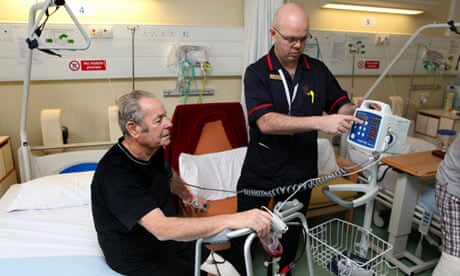Waiting times for treatment and the rationing of care have worsened and will get worse still because of the NHS's £20bn savings drive, health service bosses have warned.
Seven in 10 chief executives and chairs of hospital trusts, clinical commissioning groups and other NHS care providers fear that the length of time patients have to wait for treatment and their ability to obtain it will be hit hard in the coming year.
A report by the NHS Confederation says half of health service bosses think the two politically vital areas of NHS provision have already been affected over the last year as the service has sought to make £20bn of "efficiency savings" demanded by Whitehall.
A survey of leaders of 185 NHS organisations shows that 64% also believe that patients' experience of the NHS will suffer, while 27% expect the availability of particular treatments or drugs will be hit and 16% fear patient safety will be compromised.
This gloomy view of the NHS's prospects is compounded by 62% describing the financial situation confronting them as "very serious" (40%) or "the worst I have ever experienced" (22%).
Asked what would stop their organisation realising its share of the £20bn target in the next year, 64% identified rising demand for healthcare and 56% local councils' cuts to social care, which helps keep mainly elderly people out of hospital.
Six out of 10 NHS leaders think financial pressures or cost saving targets are risks inherent in the coalition's NHS shakeup, which took effect on 1 April, found the survey conducted by the NHS Confederation, which represents hospital bosses. A similar proportion see finance as one of the top three challenges facing the service over the next two years.
The NHS in England has been increasingly delaying or denying patients access to operations such as hernia repairs, hip and knee replacements and removal of varicose veins since 2010 as it experiences rising demand for care but flat budgets.
Over half (54%) cited the need to integrate health services and social care as a key challenge, although 93% believe either only slight (59%) or no (34%) progress is being made, despite widespread agreement it is an urgent priority. Failure to co-ordinate both types of care will lead to "an unsustainable service", 61% believe.
Asked if the government recognised the challenges the NHS is facing, 71% said no and only 29% said yes – an effective vote of no confidence in Jeremy Hunt, the health secretary. Those running NHS care providers also strongly rejected (by 71%) David Cameron's plan for creating a new chief inspector of hospitals, who was confirmed last week as Prof Sir Mike Richards, and Hunt's push to bring in tough Ofsted-style ratings for hospitals (73%) – both of which were key elements of the coalition's response to Robert Francis's report into the Mid Staffs scandal.
However, many support Hunt's plan to make would-be nurses spend time doing basic chores in hospitals before they begin training (67%) and for NHS organisations to be put under a statutory "duty of candour" to admit when patients are harmed (68%).
Two quarterly assessments of NHS performance due out on Tuesday, from the NHS regulator Monitor and the King's Fund thinktank, are expected to confirm that performance in key areas, notably A&E care, is slipping.
But Lord Howe, the health minister, rejected the NHS leaders' gloom and painted a much rosier picture. "The NHS is performing well with waiting times overall low, satisfaction high and budgets overall doing well. Overall waiting times remain low and satisfaction with services remains high," he said.
While acknowledging it faced "pressures", he promised that the coalition's care bill would "help integrate services, drive up standards and make sure people get the are they need when they need it."
He dismissed NHS bosses' concerns about the service's financial health. "We have protected the NHS budget and funding will increase by £12.7bn over the course of this parliament.
"Even so we know the NHS is facing pressures, but it is in good financial health with the vast majority of hospitals expected to finish the year in surplus," he said, adding that ministers would press ahead with a new hospital ratings system and a new chief inspector of hospitals.
"We are determined that the Francis report and the terrible events at Mid Staffs will bring about real change in the whole health system. We believe culture change is vital and NHS leaders must do everything they can to help create the open, caring and compassionate service we all want to see," he said.
Dr Peter Carter, general secretary of the Royal College of Nursing, said the NHS Confederation was "right to draw attention to the scale of the challenge the health service faces. This survey reflects real and profound anxieties felt throughout the system about the current financial pressures, pressures which most believe are going to get much worse."
Shadow health secretary Andy Burnham said the survey confirmed the NHS was "seriously struggling with the side effects from the coalition's toxic medicine of budget cuts and top-down re-organisation. The 'real-terms increases' promised by David Cameron have failed to materialise while social care has been cut to the bone. This explains hospitals are full and A&Es are in crisis."
Hunt should ensure that £1.2bn of the NHS's £2bn annual underspend n its £100 billion budget is used to improve social care and provide integrated, home-based support for the frail, elderly people who occupy a large and growing number of hospital beds, Burnham added.

Comments (…)
Sign in or create your Guardian account to join the discussion